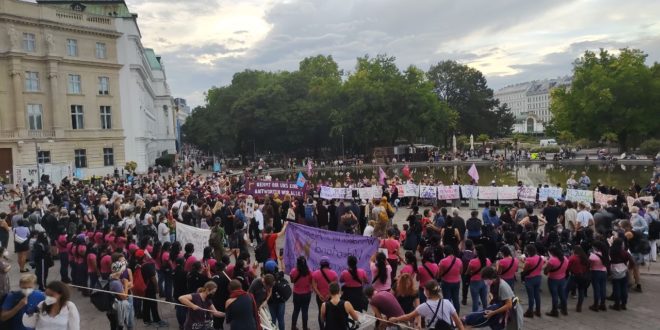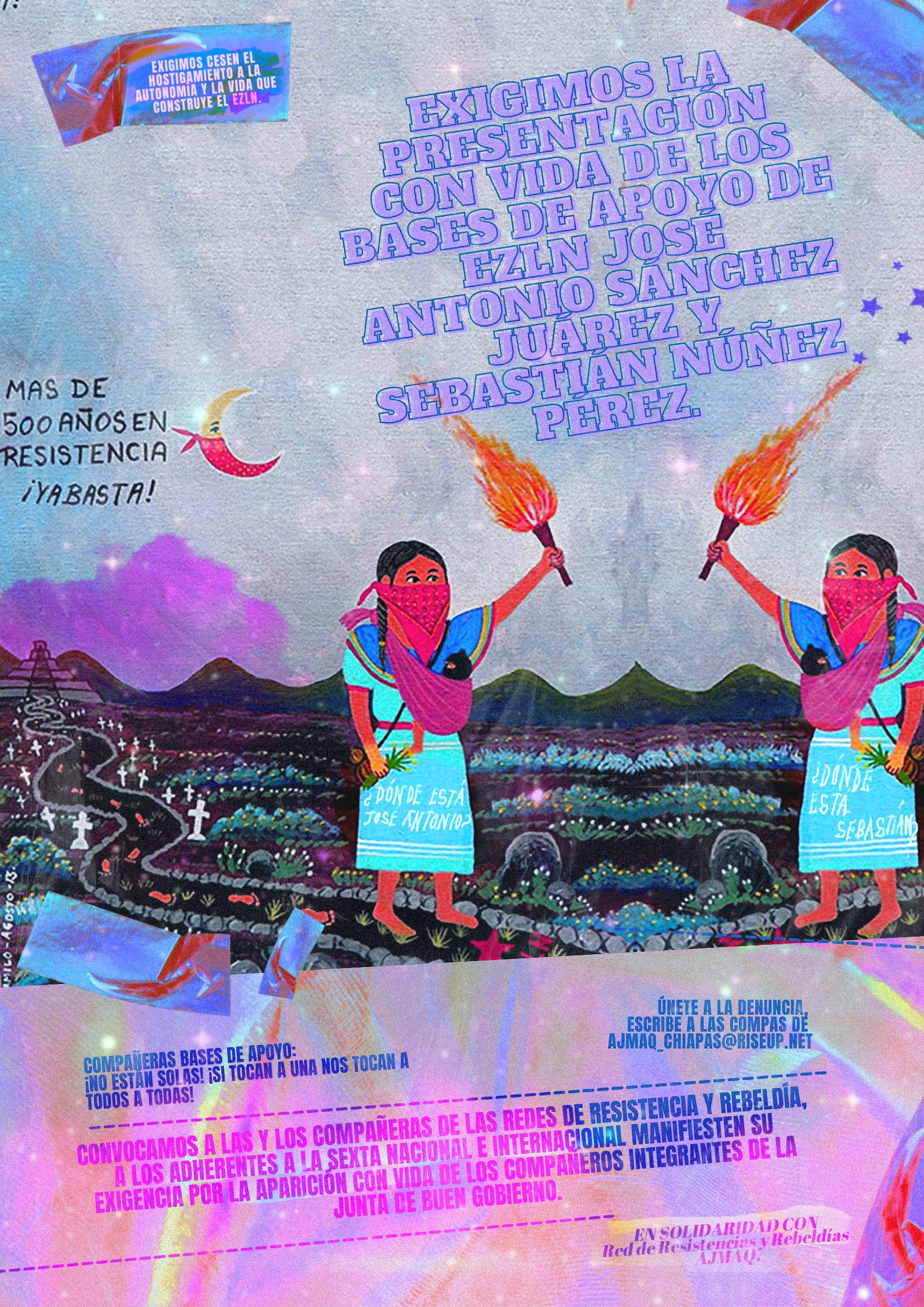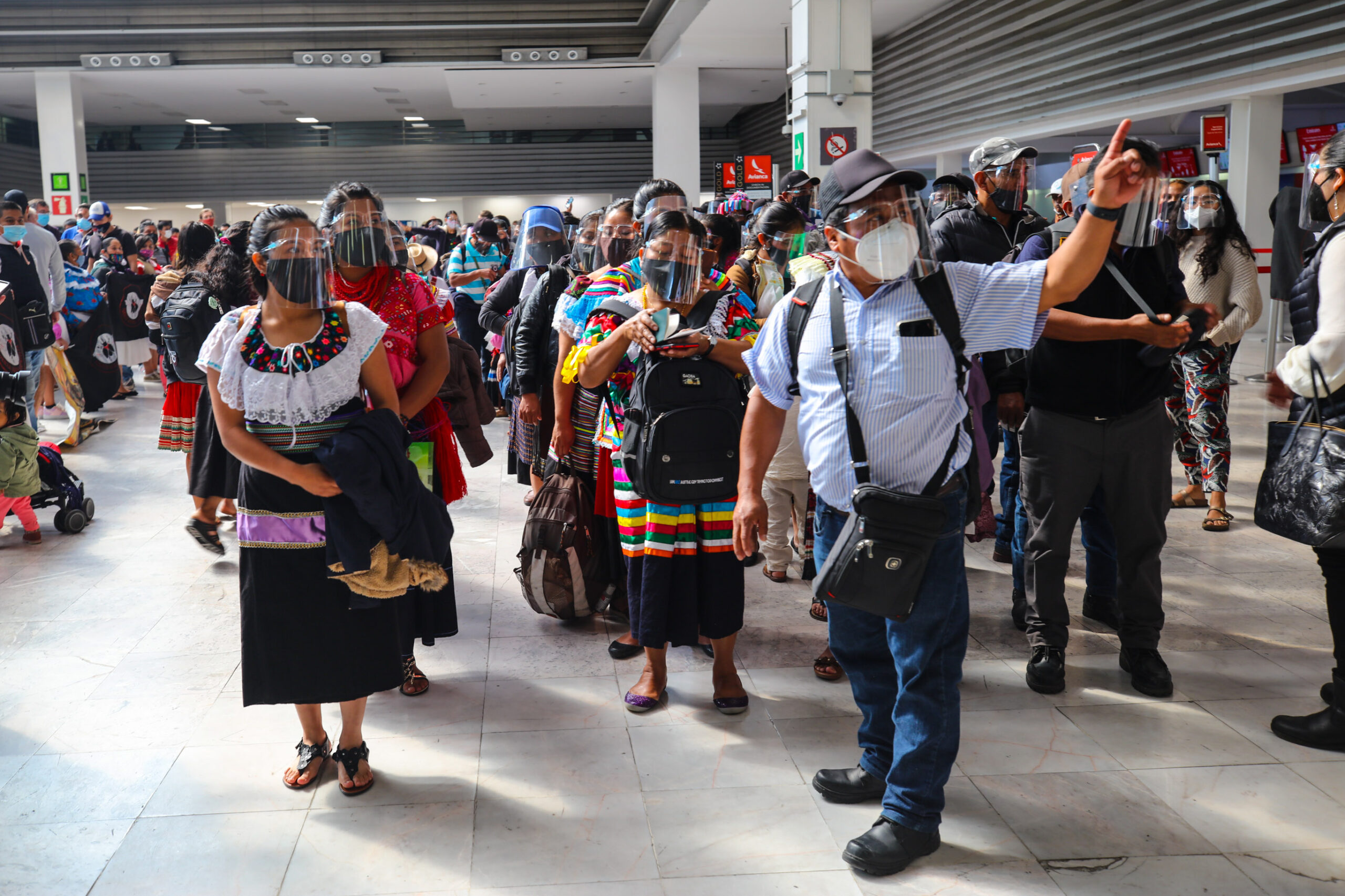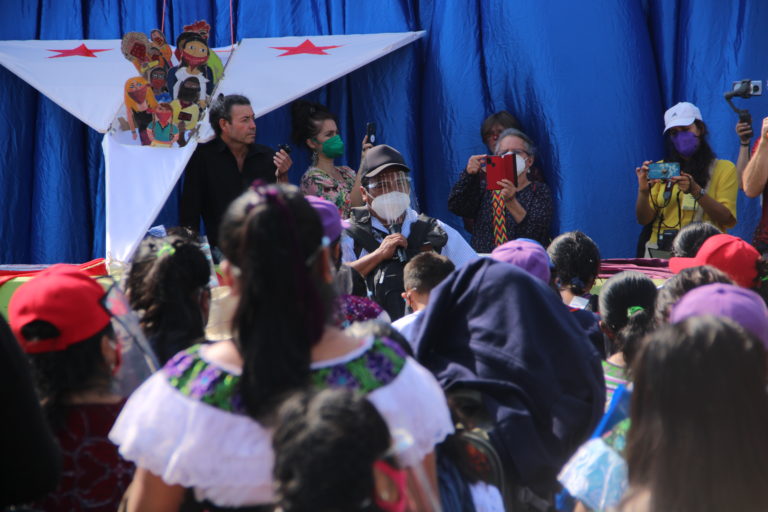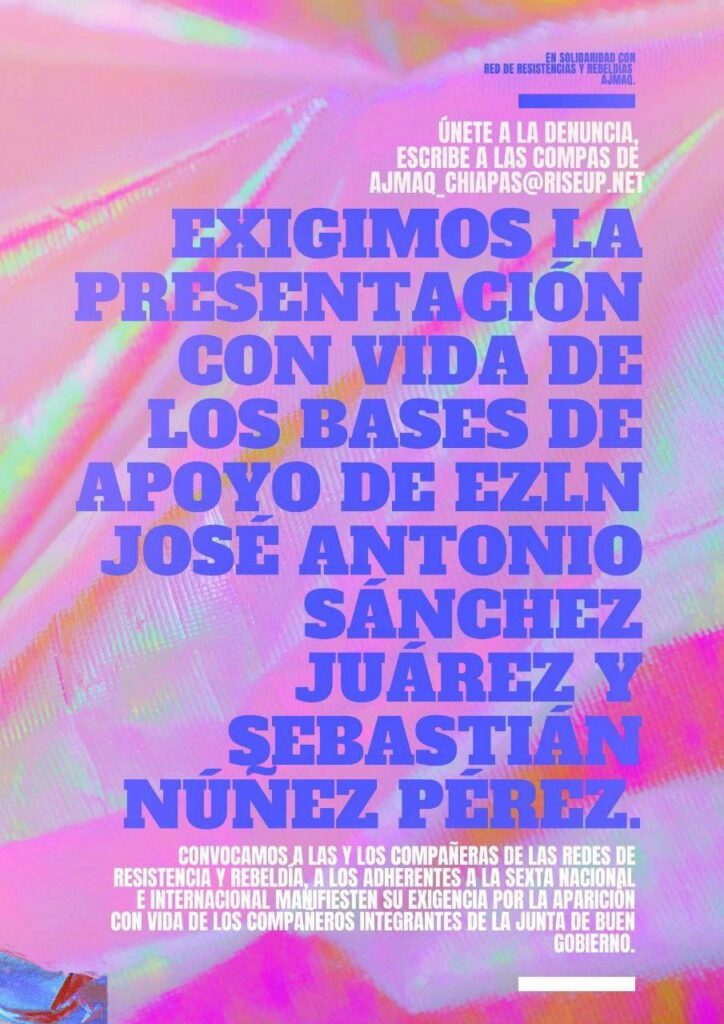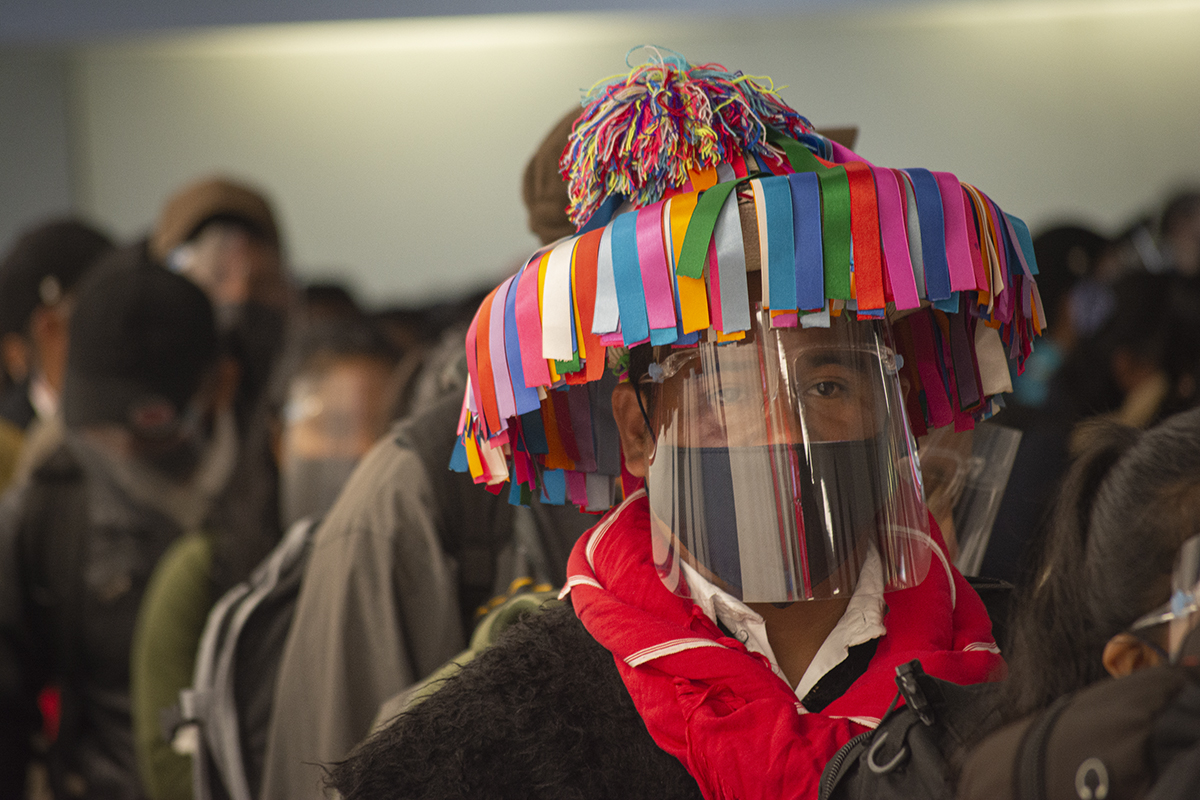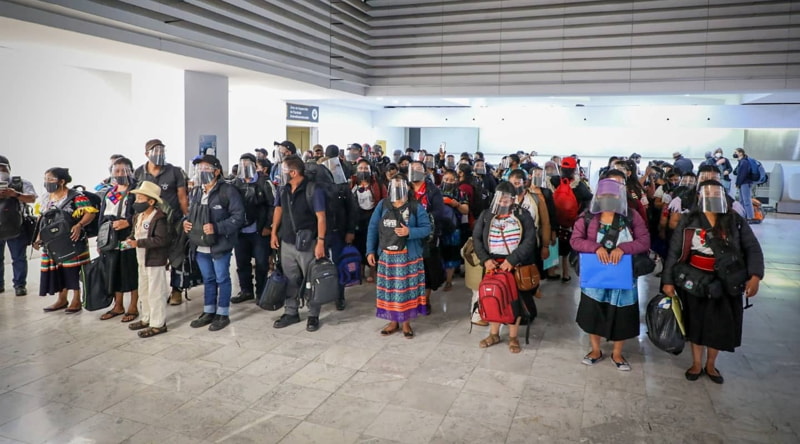(En français ici | Español aquí)
On September 11 of this year, two Zapatistas from the Good Government Council Patria Nueva of Caracol 10, Ocosingo, were kidnapped by ORCAO. After widespread mobilizations and denunciations, along with the intervention of religious authorities, they were released on September 19.
ORCAO has been denounced repeatedly by the Zapatista Good Government Councils as a paramilitary organization, which has constantly for more than 20 years threatened and harassed Zapatista communities with growing intensity and complete impunity.
The Regional Organization of Coffee Growers of Ocosingo (ORCAO) was founded in 1988 by 12 communities in the municipality of Ocosingo, Chiapas, as an organization of legitimate struggle demanding better coffee prices and a solution to agrarian backlog. In little time, many more communities joined the organization. For years, ORCAO maintained connections with Zapatismo. However, those connections were broken in the late 1990’s when the organization, like many others, caved to the temptation of government support and political positions in exchange for favors. The rupture worsened in the year 2000 with the arrival of Pablo Salazar as governor of Chiapas. ORCAO abandoned the struggle and allied with the government, breaking with the EZLN in order to gain access to state funds. From that moment on, the aggressions have become increasingly frequent and violent.
Here is a summary of the trajectory of violence carried out by the paramilitary organization:
In January 2002, around 70 members of ORCAO, armed with rocks, clubs, chains, and machetes, attacked Zapatista Support Bases in Nuevo Poblado Javier López, in the autonomous municipality of Francisco Gómez, with the complicity and support of the police.
In June 2002, members of ORCAO of Silbacá destroyed two hectares of crops in the autonomous municipality of Primero de Enero. Furthermore they demolished the territorial limits of Pomalá, threatened inhabitants of López-Chamizal, expelled Zapatistas from Ucumiljá and Ja’ten’chib (Ocosingo) and dispossessed them of 30 hectares of land, while robbing their houses and all their belongings.
In January 2009, while the EZLN celebrated the Festival of Dignified Rage in San Cristóbal de Las Casas, members of ORCAO attacked and tried to dispossess Zapatista Support Bases of 500 hectares in Bosque Bonito, in the autonomous municipality of Che Guevara. A little while afterwards, 220 members of ORCAO aboard 19 trucks and vans tried to forcibly enter the Caracol of Morelia. Around that time, ORCAO also impeded the passage of Zapatistas who were transporting wood for the construction of new spaces of the autonomous school of Primero de Enero.
In April of that same year, while police and the paramilitary group OPDDIC attacked and harassed Zapatistas around the waterfalls of Agua Azul, members of ORCAO threatened Zapatistas with death, seeking to burn the collective store in Cuxuljá (an act they accomplished in August of 2020) and setting fire to 60 hectares.
At the end of that year, the Good Government Councils of La Garrucha and Morelia denounced that ORCAO organized a group to take over the market in Ocosingo, expelling the Zapatistas.
In July of 2011, members of ORCAO invaded lands which had been recuperated by the EZLN in El Paraiso. This followed several previous attacks between March and June of 2011, in which ORCAO destroyed 4500 coffee plants, a half hectare of sugar cane, and a half hectare of corn, in addition to stealing cattle, wire, and wood. In June of that year, members of ORCAO kidnapped and tortured two Zapatistas in Ocosingo.
In August of 2011, ORCAO paramilitaries destroyed a house used by human rights observers in the community Ejido Patria Nueva, then belonging to the Caracol of Morelia. That same month, 12 armed groups of ORCAO attacked Zapatista Support Bases with firearms, sticks, and stones.
In May of 2012, the Good Government Councill of Morelia denounced land dispossession by ORCAO in the autonomous municipalities of 17 de Noviembre and Lucio Cabañas. In August of that same year, ORCAO carried out various armed attacks against Zapatista Support Bases, according to a denouncement made by the Good Government Council of Morelia.
In July and August of 2014, members of ORCAO carried out a series of attacks, displacing Zapatista Support Bases in the autonomous municipality of San Manuel, Caracol of La Garrucha. This took place just before the reunion of Indigenous peoples of the country in the Caracol of La Realidad in August of that same year.
On February 23, 2020, members of the National Indigenous Congress from the communities of San Antonio Bulujib and Guaquitepec, in the municipality of Chilón, were beaten and kidnapped by members of ORCAO and the paramilitary group, Los Chinchulines, as well as members of the MORENA political party. This attack was carried out in retaliation for the communities having participated in the Days in Defense of Territory and Mother Earth “We Are all Samir.”
On August, 2020, members of ORCAO looted and set fire to two corn and coffee warehouses pertaining to the Zapatista Support Bases, in Cuxuljá, between Oxchuc and Ocosingo, in the autonomous municipality of Lucio Cabañas, triggering strong national and international condemnation.
On November 8 of that same year, ORCAO kidnapped and tortured Zapatista Félix López Hernández, who was freed a couple days later thanks to national and international pressure. In the same denunciation, the Good Government Council of Patria Nueva confirmed that ORCAO received government support to construct a school, but that they used it to buy high-caliber weaponry, with the presumed complicity of the government of the Fourth Transformation.
In January of 2021, the Fray Bartolomé de Las Casas Human Rights Center reported new armed aggressions of ORCAO in the community of Moises Gandhi. In April, two members of that human rights center were kidnapped while on their way to a meeting in Palenque, in the community of San Felipe, inhabited in the majority by members of ORCAO, in what all indications was an act of retaliation for the documentation work of the human rights center.
It is not a coincidence that the recent kidnapping of two members of the Good Government Council of Caracol 10 Patria Nueva took place in the context of the Journey for Life, just as the Zapatista air delegation arrived in Vienna to begin a series of encounters with leftist collectives and organizations in the territory known as Europe. In the face of the struggle for life, the response is paramilitary violence promoted by the government of the so-called Fourth Transformation.
Translation: It’s Going Down

